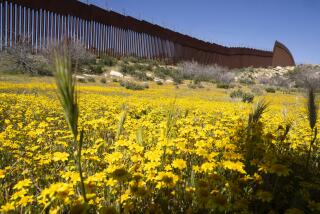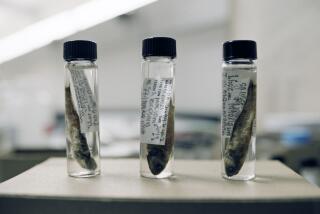Texas shrimp farms harvest a jumbo dilemma : The new industry brings needed jobs, but it also threatens an established shrimping business.
ARROYO CITY, Tex. â This South Texas town amounts to little more than a thin line. About 500 dwellings and places like Connieâs Paradise Bait Stand are sandwiched between the south bank of a stream and Farm to Market 2925, the lone road through town.
Unincorporated and largely unnoticed in the Rio Grande Valley, Arroyo City doesnât appear on many Texas road maps. It sits along the sparsely populated South Texas coast where the Arroyo Colorado flows into the Gulf of Mexico.
But Taiwanese investors found it. Over the past two years they have turned Arroyo City into the home of the nationâs biggest shrimp farms. Now, just across FM 2925 lie nearly a thousand acres of rectangular shrimp ponds, each of them five times the size of a football field.
With unemployment at 12.5% in November, five percentage points above the national average, the people of Cameron County welcomed the shrimp farmsâ business and the several hundred jobs that came with it. But because of an accident last fall, some question the wisdom of welcoming an industry that has raised the specter of an environmental calamity.
During the November harvest, tons of the farmsâ exotic Pacific white shrimp somehow escaped into local waters that feed the gulf. How remains a mystery, although the suspicion is that the shrimp got into pipes that drain the ponds.
Days later, after sport fishermen and bait shrimpers reported seeing non-native shrimp in area waters, state officials caught more than a ton of the Pacific white shrimp in the Arroyo Colorado, the farmsâ water source, and Laguna Madre, the waters between the Texas coastline and its barrier islands on the Gulf of Mexico. And in February, the shrimp were also found in the gulf.
The environmental fallout may not be known for years. The main worries are that the exotic shrimp will introduce diseases to the native species and that they will compete with the local varieties for food--as has happened in other cases of introducing new forms of plant or animal life to an area.
âItâs quite alarming,â said Ken Johnson, a specialist in fish diseases at Texas A&M; University.
Gulf shrimpers are the most vocal critics of the operation.
âThey were an accident waiting to happen,â said Deyaun Boudreaux, coastal environmental director of the Texas Shrimp Assn., which represents 700 gulf shrimping vessels. âThey did not presume the exotic could be harmful and prove it safe. They assumed it was safe. It was very careless.â
But Harry Sun, general manager of Hungâs Shrimp Farms, one of the two largest operators in Arroyo City, said: âWe wanted to do good.â
At a public hearing on the issue, he reminded state officials of his companyâs $14-million investment. âWe canât just wrap up and go,â he said, warning that severe regulations would seriously affect new investments.
Few Arroyo City residents criticize the farms or question their safety. Business is up and the shrimp farm owners have been good neighbors in the community. For the first time, Arroyo City has a county constable, due largely to the jobs and tax base created by the shrimp farms.
Still there is concern. In January, state officials imposed stricter regulations on the farms, some of which were operating without proper permits. Other possible violations are being investigated by wildlife officials and the state attorney general. A lawsuit is being contemplated by the shrimp association.
With Texas still coming out of the oil bust of the â80s, there is little chance of the farms being closed down, despite some criticism of economic expediency as the reason to keep them open. Experts also concede that escapes will occur, no matter what regulations are imposed.
But Texas A&M;âs Johnson said scientific and public policy decisions on the subject are not simple.
âIf youâre dealing with exotics, thereâs never going to be no risk,â he said. âBut if you donât make attempts to introduce things that are potentially good, then you have the possibility of causing a risk to human endeavor.
âWhere the balance is, I really donât think we have enough information to say.â
More to Read
Sign up for Essential California
The most important California stories and recommendations in your inbox every morning.
You may occasionally receive promotional content from the Los Angeles Times.










